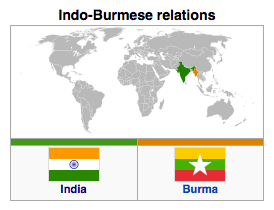Indian Government In Dilemma Over Muslim Killings In Myanmar – OpEd
The violent protest in Mumbai that snuffed out two precious lives is the most visible dissent witnessed on Indian soil till date against the Myanmar government’s brutal policy of disowning the Rohingya population settled in the Rakhine province since eighth century. Government officials in New Delhi however remain steadfast in maintaining a stoic silence on the recurring ethnic clashes between Rohingya Muslims and the Buddhist majority that elicited angry retort from the international community especially the Islamic world.
Pursuing a middle path of addressing the humanitarian concerns of the Rohingya refugees languishing in India by providing them with long term visas and simultaneously pampering the nascent democratic regime in Naypyidaw seems to be the only viable diplomatic alternative available with the Foreign Ministry mandarins.

Myanmar’s assistance is after all a critical component of India’s security strategy to contain the ethnic insurgent groups rummaging through the country’s northeastern territories. The corridor in erstwhile Burma’s inhospitable jungle terrain across the Indian frontier is put to good use by the militant organizations attached to multifarious ethnicity of this region in launching deadly strike on civil-military assets and the local populace.
Unfortunately, the roots of multicultural nationalism have failed to penetrate the unique ethnic mosaic of this remote part of the Indian state regarded as the country’s gateway to Southeast Asia.
Hence, polarization on the basis of racial, cultural and tribal affiliation is a common phenomenon that has driven this belt into a simmering hotspot of sectarian enmity.
Sandwiched between the traditional Indo-Aryan culture and the Mongoloid customs, the indigenous people inhabiting the northeastern region of India suffer from extreme insecurity. Such apprehension actually stems from the lack of psycho-cultural relatedness with the mainstream Indian society.
Any migration, either from the Indian mainland or neighboring countries is therefore construed as an aggression on their identity and a threat to the sub-national aspirations of the local folk.
Under these circumstances, the influx of battered and displaced Rohingya Muslims into this zone is latent with the possibility of giving rise to a serious communal conflagration.
With President Thein Sein’s administration virtually declaring the entire 800,000 Rohingya population persona non grata in their territory, the poor stateless displaced are stealthily making inroads into the adjoining Indian-controlled Andaman and Nicobar Islands as well as the northeastern provinces. But then the Indian policy makers are groping in the dark to discover an adequate way of handling these unwanted and discriminated asylum seekers.
As Myanmar embarks on partial political, economic and societal reforms in a calculatedly phased manner to attract foreign investment, it is highly unlikely that the West led by the United States would risk assigning strategic value to the human rights violation or ethnic cleansing of Rohingya community. Any intervention through covert action similar to the ones employed in the Middle East will ultimately be detrimental to the economic interest of the multinational firms eying Myanmar’s abundant energy reserve.
In the absence of even nuanced condemnation of the government sponsored repression of minorities in Myanmar from the highest echelon of the Western leadership particularly America, India finds herself in a precarious bind, completely undecided on its strategic course in a vital buffer zone. Whether the administration and society at large in India’s northeastern states are ready to accept the extra burden of refugees remains the most potent question that the strategists in New Delhi are faced with currently. India is in a real dilemma.
In the absence of an official initiative, those trickling in can turn into invisible migrants surviving outside the purview of all scrutiny. This is exactly where the Indian security apparatus is having a nagging headache day in and out.
This article appeared at Arab News and is reprinted with permission

“..recurring ethnic clashes between Rohingya Muslims and the Buddhist majority ….”
Big bullies? Is it real? Is there a reason at all?
“Whether the administration and society at large in India’s northeastern states are ready to accept the extra burden of refugees ….”. Funny rhetoric.
Why should India interfere in the internal affairs of MYANMAR.India’s cup of problems are already full and unable to solve its own ethnic problems in NORTHEAST.
There were only a few hundreds of muslim settled in Rakhine in 8th century. Majorirty of them are migrated in 20th century from Bangladesh.
It is misleading to say they lived there from 8th century.
Excellent mood of Seema Senguta,understanding your humanity and honesty on human being futher deliberate the human right,itis realy problem on Rohingya in Myanmar,rather mranmar secruty force,military and including Rakhine Extremist hooligan dehumanize,unlawfu killing,burning properties,looting valuable things,destruction household thing and gang rape,kidnap,arbitary arrest,mass grave,besides it is very Clear cut systematic Ethnic Cleansing Techique in that,Rohingya are not only continuosly being killing but also their key food supplies are blocked, president Thein Sein is not doing anything to protect the live of Rohingya, rather he is indirectly helping Buddist Rakhine to carry out genocide by military regime